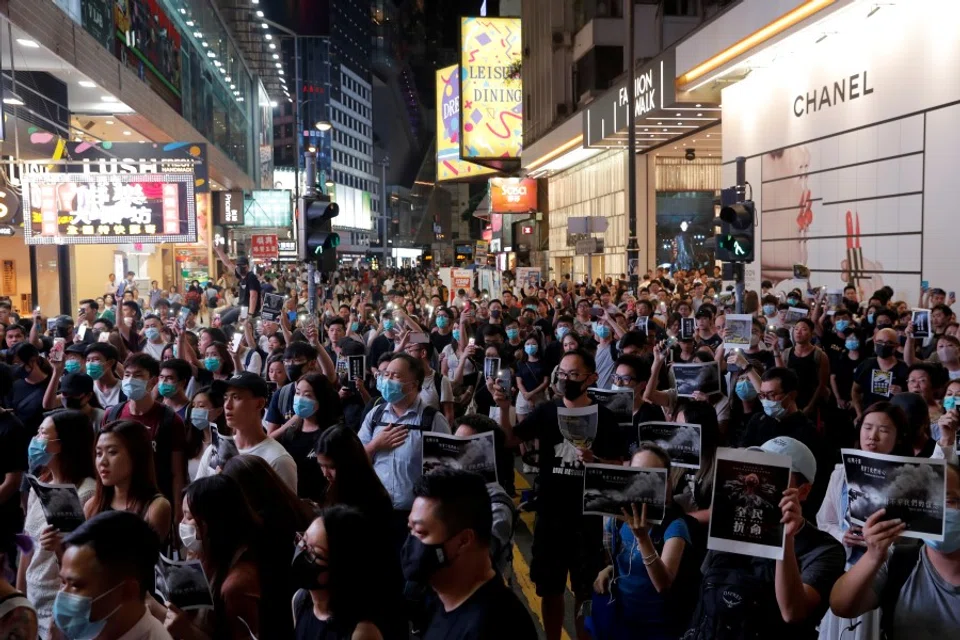Hong Kong will not be sacrificed: The problematic "Independence" label (Part I)
After over 100 days of protests in Hong Kong, the phrase "Hong Kong independence" has been raised, not just in Hong Kong itself, but also in Taiwan. But what does that concept really entail, and is it truly feasible? Hong Kong political commentator Leung Man-tao casts doubts on the sincerity of some Taiwanese supporters of the Hong Kong movement.

What a long summer it has been, and what a season of change for Hong Kong.
Many people have developed stronger bonds for this city they live and grew up in. They realize that she is no longer just a treasured land beneath the Lion Rock where people are satisfied with simply living a peaceful and comfortable life, making money merrily. Hong Kong also possesses a set of ideas and values that is worth sacrificing for. Some believe that a sort of communal consciousness, like nothing seen before, is taking shape right before us. They even boldly assert that the unfolding movement is one of independence for Hong Kong.
But is that true? We must clarify that the pursuit of so-called "Hong Kong independence" is in its most fundamental, a political proposition. It recognizes Hong Kongers not as people of China, but as a completely different nation, such that it is necessary to push for Hong Kong's independence from the People's Republic of China, to the point that it gains the world's recognition as an independent sovereign state.
I am speaking of the shift of a certain local collective identity, of an originally rather vague communal consciousness turning gradually towards "Hong Kong independence". In other words, a crisis that could alter the fate of Hong Kong is upon us.
Despite having lived through more than 100 days of unrest, I remain very doubtful about the number of Hong Kongers who will agree with such a proposition. "Hong Kong independence" as a political goal is not only undesirable, but also not pursuable in reality. This is not just my personal view, it is probably shared by many of our citizens who participated in the recent series of protests.
According to a survey by the Chinese University of Hong Kong's School of Journalism and Communication two months ago, even the questionnaires retrieved from the actual agitation event sites indicated that most of our demonstrators continued to accept "one country, two systems" as the political-systemic arrangement for Hong Kong.
Now, two months later, we do not have further studies to show if the general opinion has changed significantly. Nevertheless, any sensitive observer can probably detect the beginning of a new trend: the shift of a certain local collective identity, from a rather vague communal consciousness into a voice for "Hong Kong independence".
In other words, a crisis that could alter the fate of Hong Kong is upon us. How are we to prevent the situation from slipping down an even more treacherous slope? The first thing we must do is to reject the overuse of the term "Hong Kong independence", and the unrestrained mushrooming of its interpretation in Hong Kong, mainland China and Taiwan.

Let's look at Taiwan. Many intellectuals in Taiwan pay much attention to Hong Kong's problems. They produce all sorts of analysis and voice their support from afar. Their opinions spread widely and gain much approval amongst the Hong Kong protestors. The movement here indeed has a strategy of extending outwards, hoping to receive foreign support, right from the start. From the participants' viewpoint, this may seem hardly worthy of reproach, but the direct intervention into international politics can easily turn the movement into a dangerous gamble.
With regard to the Taiwanese friends who have always loved Hong Kong so much, I say: Don't they ever worry that what they do might indirectly lead to our demise?
Let us consider the United States. Consider how Donald Trump betrays the Kurds in the matter of the Syrian civil war. Is that not the most revealing warning for us? In view of analogous dangers, our activists ought not to take every word from Taiwan as gospel from Heaven when they engage in the "networking" between Hong Kong and Taiwan.
Take, for example, a speech by a certain Taiwanese scholar that is being spread around quite widely in our city. It sweeps the various manifestations of our movement under the rubric of "the formation of Hong Kong as a nation". Furthermore, without any basis in substantial evidence, it casually declares what's going on here a movement for the independence of Hong Kong, and claims that almost all of the SAR's university students are pro-independence. To anyone who is clear-minded in even just the slightest bit, I say: Does such talk not sound almost exactly like what some of the Mainland's media are saying online? With regard to the Taiwanese friends who have always loved Hong Kong so much, I say: Don't they ever worry that what they do might indirectly lead to our demise?
Undoubtedly there have always been differences between Hong Kongers and the Mainlanders in terms of lifestyle, social habits and ways of thinking. The differences may be greater than those between the Shanghainese (or Beijingers) and people from other parts of mainland China. Even so, is the disparity wide enough for all of Hong Kong's populace to deny their Chinese identity? While it is true that a certain "communal consciousness" has emerged within the span of merely four months amongst the citizens who sympathize with or actually take part in the ongoing movement, can we really characterize it so rashly as the rising awareness of a separate nation in its own right? By doing so, would we not be taking too lightly the accumulated depth of a collective identity?
I think we should all seriously rethink the slogan "Hong Kong today, Taiwan tomorrow".
As I have said in the past, a Chinese identity in the broad sense has always been a highly important constituent in the Hong Kongers' complex and ambiguous sense of who they are, as can be seen even in the kung fu action movies of Hong Kong's popular culture.
History has brought us to this point, where "we" and "they" are not only dissimilar though the same, but also akin despite being different. It is precisely because of this complex interrelationship that we need the special framework of "one country, two systems" to take in and deal with the relevant realities or issues that come with it. Even if the concept of the policy originally stemmed from the practical necessities at the time of its inception, and did not have the way amply paved for it by theory, it does not mean that it is no longer worth any further exploration at all. Must we really give up on tuning it in praxis through trial and error?
It should be noted that there are many countries in the world that have to deal with the emergence of local consciousness, which is a much more serious problem in places like the UK, Canada and Spain than in Hong Kong. Must each of these cases arrive at no other outcome but the independence of the restive locality, the breaking up of a country? Although the system in China and those in these Western constitutional democracies differ, do we have no chance at all of learning from the experience of others?
I am going to say something here that will offend many of our Taiwanese friends. I feel that when one looks at Hong Kong's crisis with pan-Green inclinations, it is all too easy to become guilty of the problematic application of one's own predetermined narrative to Hong Kong. We should all seriously rethink the slogan "Hong Kong today, Taiwan tomorrow". For the demonstrators in Hong Kong who first put forth this slogan, the strategic objective was probably about influencing Taiwan (including its general elections), so as to pressure the SAR government from without to give in. In Taiwan, however, especially from the pro-Green perspective, the two-part statement is a warning, intended to prove the failure of "one country, two systems" with the case of Hong Kong. The same slogan is meant to achieve very different objectives.
Even though these people speak of supporting Hong Kong, in reality, the worse Hong Kong gets, the more will they be able to prove themselves right. Aggravation in our city is the only possible justification for them. The ultimate proof for these people, I fear, would be a massive military suppression in the SAR.
Let us boldly imagine what would happen if Hong Kong finds relief for its current crisis somehow. In fact, let's go further; let us imagine that a dramatic turnaround occurs in the end, delighting all of us beyond our expectations. Would it mean that Taiwan no longer has to fear "one country, two systems"? Can our friends from the pan-Green camp truly accept such an outcome, even when it is good news for Hong Kongers?
Note this: I am not casting doubts on the sincere concern any Taiwanese may have for Hong Kong. Nevertheless, it is necessary for me to remind them: They must not force their own political proposition onto Hong Kong thoughtlessly, because inherent in such misapplication may be a bizarre logic that they themselves may not even be aware of. The logic goes like this: even though these people speak of supporting Hong Kong, in reality, the worse Hong Kong gets, the more will they be able to prove themselves right. Aggravation in our city is the only possible justification for them. The ultimate proof for these people, I fear, would be a massive military suppression in the SAR.

Most disturbingly, the discourses of some of our Taiwanese friends are similar to those of a small minority of our local commentators. They both entertain certain extremely bizarre fantasies about the future. Even as they advocate Hong Kong's independence and assert that the current movement here is pro-independence, they only toss vacuous slogans around when it comes to delineating the exact road map for achieving the radical goal. These include statements like "the dictatorship will surely be crushed", "we must have faith in the people of Hong Kong" and so on. I really would like to know where such "faith" comes from and what evidence there is for optimistic claims like those given above. I hope these people are not thinking like many of our advocates of "mutual destruction", folks who imagine that by "sacrificing" Hong Kong, we can eventually get the whole world to boycott China, bring the Asian giant's economy to ruin and thereby cause the Chinese government to collapse!
I said many years ago, the pursuit of "Hong Kong independence" shares a similar problem with indigenous extremisms of all stripes around the world. It hangs the final goal of its proposed political movement on the imagined, almost apocalyptic scenario of "the collapse of China" or the like. (We have, incidentally, heard prophecies of just such a collapse countless times since three decades ago.) As far as political praxis is concerned, does this count as a responsible proposition?
But enough of Taiwan; we shall take the discussion onwards next week to a related issue: the Mainland's expansion of the label of "Hong Kong independence".
(Originally published in the Apple Daily)





![[Photos] Fact versus fiction: The portrayal of WWII anti-Japanese martyrs in Taiwan](https://cassette.sphdigital.com.sg/image/thinkchina/3494f8bd481870f7c65b881fd21a3fd733f573f23232376e39c532a2c7593cbc)